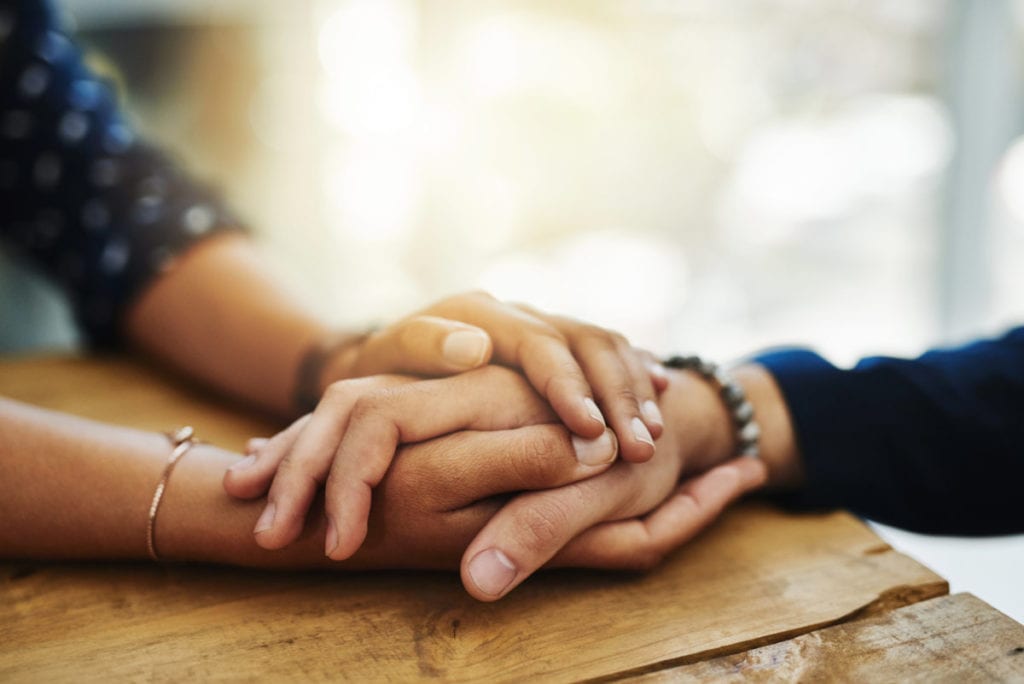Losing a loved one is a life-changing, overwhelming and awful event. Whether you’ve lost a spouse, child, or parent, the loss of someone you love provokes a series of grief responses, which is a completely normal psychological response to the loss. Grief is a universal response; however, it is completely individual and personal, because no one reacts the same way, it will manifest differently for everyone. Although everyone will grieve in different ways, there are a variety of feelings that people experience when going through grief. Navigating the loss of a loved one is never easy; there are some coping strategies that may help you through it. In order to help you heal and deal with the loss, here is the meaning of grief, the five stages of grief, and suggestions on how to get through them.
What is Grief?
Before you can understand or begin to cope with the various stages of grief, it’s helpful to understand the concept of grief. Grief is a natural response to loss; unfortunately, the pain someone may experience from their loss may be so overwhelming that they experience a number of different conflicting emotions ranging from guilt and sadness to disbelief to anger. In some cases, the pain associated with grief may be disruptive to the extent of interfering with their mental and physical health. There is no denying that coping with the loss of a loved one is a painful experience, but it is critical to understand that you should never feel ashamed of your feelings. It is personal and everyone who cares about someone will go through the experience of grief; whether it is expected or unexpected, slowly or suddenly, it doesn’t matter, grief is an overwhelming process. You can get grief counselling from an experienced grief counsellor in Melbourne. We understand how painful and difficult it can be.
The 5 Stages of Grief
Although there are several theories used to explain grief, one thing that everyone can agree on is that when grieving the loss of a loved one, people go through five distinct stages. Denial, anger, bargaining, depression, and acceptance are all stages of grief. It is important to note that although everyone will go through all the grief stages, not everyone will follow the stages in the same order. The stages/process of grief is as unique as each individual that is going through it. The five stages of grief and how to navigate them:

Denial
Denial is often the first stage in the grieving process. For many people, the pain of losing a loved one may be so overwhelming that they inadvertently deny or are in shock and don’t believe what has happened. Denial is a coping mechanism that helps people minimize the overwhelming impact of the pain they are feeling from the loss. The loss may be so painful and overwhelming that the human brain actually needs some time to adjust to what has happened. While in the stage of denial, many people find themselves struggling to find a way to move forward. Denial helps to slow the process of your mind digesting the information; it allows you to “pause” the process and take things in one step at a time. Denial doesn’t mean that you’re pretending you haven’t experienced a loss, it simply means you are attempting to absorb and understand what is happening. Getting through the denial stage may seem overwhelming because the fear is actually the new reality; however, there isn’t a timeline as to when or how long it will take, but you will get through it.
Anger
It is a common and natural response for people to experience anger when they lose a loved one. When you lose a loved one, anger is a way your body and mind are trying to adjust, while going through intense emotions. It’s important to note that feeling anger after losing someone doesn’t mean you are vulnerable; in fact, in many cases, people prefer accepting their anger over confessing that they are scared. Anger allows you to express your feelings without the fear of being judged or rejected. It is unfortunate that anger is often one of the first things people feel after a loss, because it also may leave them feeling isolated while they are going through these overwhelming feelings. Know that this is a natural feeling, you have experienced a loss, it is your right to feel anger, and it is your feelings, so there is no timeline as to how long your feelings of anger will last.
Bargaining
After the loss of a loved one, people tend to search for ways to minimize or eliminate their pain. The loss of someone you love may push you to want to do almost anything to avoid the pain. Everyone bargains in different ways; making promises if only it will lessen or get rid of the pain. For instance, someone who is religious may make promises to their higher power, which in this sense means that you are attempting to appeal to your higher power and request the chance to change the circumstances. Humans often turn to a higher power when they realize that what is happening is beyond their control. As you begin to understand that there is nothing you can do to improve the situation, bargaining may seem like a way to help you gain control of the event that seems to be beyond your control. This is also the stage in the grieving process when you may look back at moments or interactions when something could’ve been different; basically, you wish you could go back in time and make things better.

Depression
Depression is often the fourth stage of the grieving process. As you process the loss, there will be a time when you begin to calm down and examine the reality. It is during this stage when most people feel as though there is no point in continuing to bargain and instead must confront the situation. During the depression stage, it is when you may truly begin to feel the loss of your loved one; as your feelings of panic, denial, and bargaining begin to reduce, the weight of your loss becomes more real. It is during these moments of reality when your sadness in relation to the loss grows and most people will become less sociable. Although depression after the loss of a loved one is a natural part of the grieving process, dealing with depression can be extremely isolating. If you are someone you care about has experienced the loss of a loved one and struggling with depression, the best thing to do is seek help, whether through a therapist or through a grief group.
Acceptance
The final stage in the grieving process is acceptance. When you start to acknowledge and accept the loss of your loved one, it doesn’t mean that you are no longer feeling pain from your loss, it means that you have stopped fighting the reality of what has happened, and you are learning to live with it. It is extremely important to keep in mind that even when experiencing the acceptance phase, you may still struggle with moments of regret, guilt, depression, sadness, and anger, but you will be less angry and are ready to look forward to your future.
Dealing with loss affects everyone differently, although the five stages are something that everyone goes through, the order in which these stages are experienced is not set in stone. Seek professional counseling if necessary, join a grief group, write in a journal or talk to family or friends, however, you choose to process the experience and feel your emotions, it is important for your physical and emotional health that you process and learn to cope with your grief.






